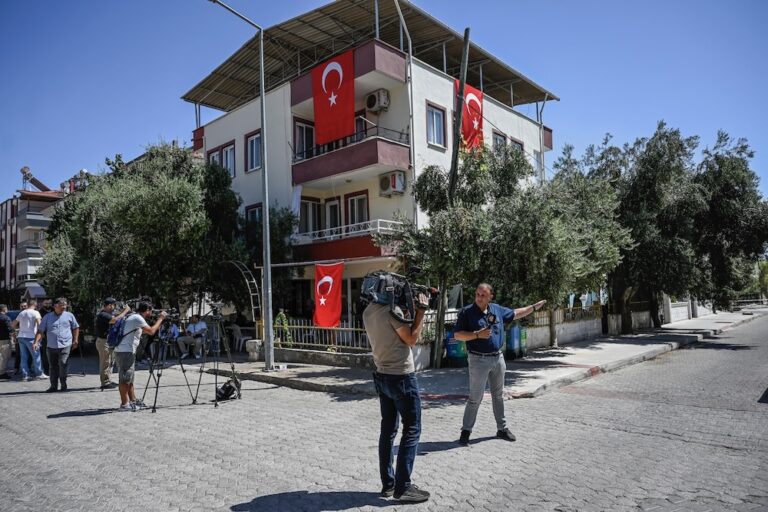The Television Broadcasters Association determined that certain "principles of news should be followed in situations of terror and other extraordinary circumstances".
(BIANET/IFEX) – At a recent meeting of the Ministry of the Interior, the Radio and TV Supreme Council and TV officials developed new principles for news about armed conflicts. It was announced that media outlets should refrain from broadcasts that justify or encourage terror. The Contemporary Journalists’ Association criticized the principles.
The Television Broadcasters Association (TVYD) as part of the Radio and Television Supreme Council (RTÜK) determined in compliance with all national channels that certain “principles of news should be followed in situations of terror and other extraordinary circumstances”.
It was agreed that broadcasters will put a time limit on “breaking news” flashes on television and not announce the names of people killed in armed conflicts before their families have been informed by the authorities.
Another principle announced was the media’s responsibility to “refrain from all sorts of broadcasts that deliver a justification of terror, that could be perceived as propaganda for the attackers and that encourage further attacks”.
RTÜK President Davut Dursun organized the “Media Awareness Advisory Meeting” on 25 June 2010 in Istanbul together with the Minister of the Interior, Beşir Atalay, the Public Order and Security Undersecretary Muammer Güler, and Chief of Police Oğuz Kağan Köksal. A TVYD member reminded the delegation of the fact that responsible news editors of national channels participated in the meeting as well.
Dursun had announced after the meeting that TVYD determined the broadcasting principles in co-operation with responsible news editors of the national channels. He congratulated the broadcasters for “the most decisive position on terrorism so far”.
“We must not think of a possible restriction of freedom of expression and of the public’s right to be informed with the adoption of the principles. Freedom of expression in the broadest sense is fundamental in times of crisis. Regulations that would restrict our freedoms because of terror or similar incidents would not be supported at all”.
According to the decisions, live broadcasts of breaking news will be interrupted to turn back to the normal program if the incident does not present fresh developments of the situation. The latest developments will then be broadcast in the news bulletins as part of the running program.
Outdated footage or pictures that show the faces of members of illegal organizations will not be used; this material shall not be repeated and old footage should be labelled “archive” during a broadcast.
Identities of soldiers who died in conflicts will not be broadcast before their families have been officially informed. News staff will not go to the mourning families and interview them before they have been informed by the authorities. There should be no live broadcasts from funeral ceremonies and from the homes of the mourning families, unless there an exceptional situation occurs.
The President of the Contemporary Journalists’ Association (ÇGD), Ahmet Abakay, criticized the principles and stated that they are “open to abuse”.
Abakay told Bianet that the principles have their positive sides but that journalists should be careful about certain aspects. He emphasized the fact that broadcasts provoking people to war are forbidden in Turkey by the Constitution. He stressed that the statutes of the ÇGD, the Charter on Rights and Responsibilities of Turkish Journalists and the International Journalists’ Federation are in line with the principles.
“However, we have frequently criticized the recommendations related to terror propaganda which have been taken from the Anti-Terror Law [TMY]. The TMY brings everybody to court and we are against it in the first place. […]”
“Seven-hundred journalists are currently being tried in Turkey; 45 are in prison. From Vedat Kurşun from the Azadiya Welat newspaper to Mustafa Balbay from Cumhuriyet newspaper . . . They cannot do their work because they are detained pending trial. The TMY restricts freedom of expression and puts journalists in jail. They established the correct principles but in the above mentioned aspect they went too far”.


